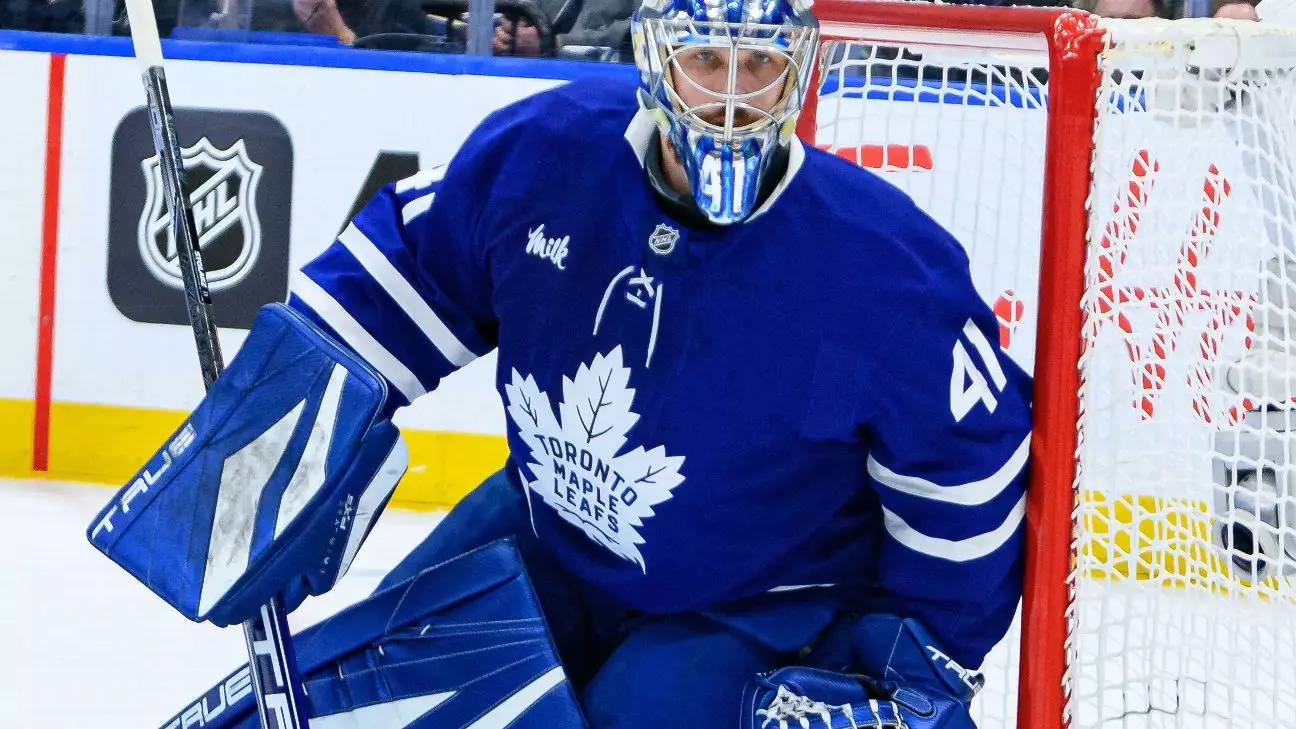The world of professional hockey is both exhilarating and daunting. On a high-stakes night in Toronto, the Maple Leafs faced off against the Florida Panthers in Game 1 of their playoff series. The game had its fair share of thrills, but it was marred by a serious moment when goaltender Anthony Stolarz, who had just joined the Maple Leafs this season, suffered a head injury after taking an elbow from Panther Sam Bennett. The rapid progression from an elite-level competition to a player being carried off on a stretcher speaks volumes about the physical demands of this sport. Stolarz’s abrupt exit threw the energy of the game into turmoil, leaving fans in a state of unease and highlighting the inherent risk that accompanies the role of a goaltender.
In a game where adrenaline and emotions run high, players sometimes forget that their opponents are not neatly categorized between giants and regular-sized athletes; they are all capable of causing genuine harm. Stolarz’s incident adds a layer of complexity to the game that players and coaches must navigate. The aftermath featuring the starting goalie leaving the ice and vomiting on the bench leads to a grim reality check about the toll of playoff hockey and the personal stakes involved.
The Return: Optimism and Uncertainty
The news that Stolarz was present at practice the morning after such a terrifying incident was indeed a relief. It symbolized resilience—a core trait among athletes—and a glimmer of hope for the Maple Leafs, who were eager to maintain momentum following their 5-4 victory against the Panthers. However, uncertainty still looms over his potential participation in Game 2. Coach Craig Berube’s cautious words reflect a widespread sentiment around player health in sports: while the instinct to push forward is powerful, the well-being of the athlete must always take precedence. The phrase “we’ll see” hung in the air like a question mark, a reminder that the human body has limits even when ambition knows no bounds.
Yet, the lack of clarity on whether Stolarz suffered a concussion raises questions not merely about his fitness for the next game, but about the larger conversation surrounding head injuries in the NHL. How can coaches and teams balance the desire for victory against the pressing need for player safety? While Berube mentioned past eras that favored retaliatory actions on the ice, the modern game compels teams to exercise discipline—an often difficult line to balance amidst temptations for vengeance.
The Backup Hero: Joseph Woll’s Steady Hands
Should Stolarz be unable to play, the Maple Leafs have Joseph Woll waiting in the wings, a backup goaltender whose past performances provide a silver lining. Woll’s experience in previous playoff runs has imbued him with a confidence that the team seems to rally around. When called into duty during Game 1, he provided stability and showcased his growth as a player, stopping 17 out of 20 shots while the team clung to a precarious lead. The performance clearly indicated that the Maple Leafs possess depth in critical areas, which is vital for their playoff journey.
However, reminiscing about Woll’s previous playoff appearances harbors its own complexities. His journey has been one filled with challenges, injuries, and missed opportunities. Yet, every time he’s been thrust into the spotlight, he has stepped up despite the weight of expectations. The Maple Leafs, equipped with this resilient backup, find themselves in a position that offers hope, underscoring the vital contributions of every player in the high-stakes environment of the postseason.
The Emotional Toll of Playoffs
The emotional landscape of playoff hockey cannot be overstated. Beyond mere physical challenges, the psychological weight of witnessing team members succumb to injuries is profound. Stolarz’s teammates experiences an unsettling blend of fear, concern, and indignation—feelings which may translate into the performance and demeanor of the team moving forward. For Jake McCabe, witnessing his goaltender go down invoked deep-seated protective instincts—common among athletes who share the ice with each other.
The pressure cooker of playoff aspirations also brings a sense of urgency to stick together as a unit, resist impulses for retribution, and channel that energy into strategic execution. The acknowledgment from Berube about the changing nature of the game signals growth, not only in approach but in how players view their roles as protectors on the ice. The shift from personal vendettas to team discipline may prove critical as they pivot into the remaining games of the series.
As the Maple Leafs navigate this tumultuous journey, the saga of Anthony Stolarz is far more than just his individual story—it becomes a lens through which we can examine the multilayered emotions and complexities of the NHL playoffs, where athletes are defined not only by their skills but also by their capacity for resilience amidst adversity.

